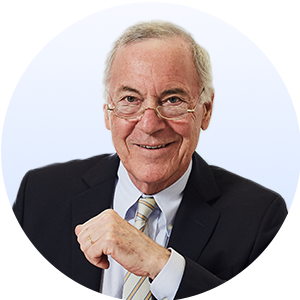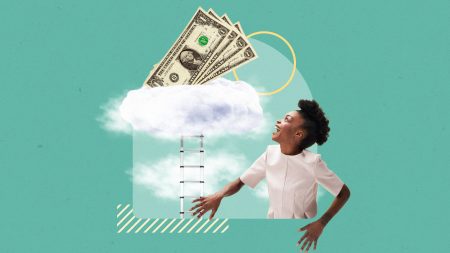Key takeaways
- The president can influence the stock market, but other factors can have a greater impact on share prices, such as consumer behavior, the Federal Reserve and global trade.
- President Donald Trump’s tariff announcements have been unpredictable and have negatively affected the stock market, at least temporarily.
- When stock markets fluctuate, don’t panic. Experts recommend playing the long game, especially if you’re younger.
The stock market has had a turbulent start this year — and many experts are pointing to President Donald Trump’s tariff policy as a reason why.
After Trump implemented widespread tariffs earlier this year on imports from Mexico, Canada and China, the S&P 500 index dropped sharply — by 5.8 percent in March, the steepest monthly decline since December 2022, when the Federal Reserve was increasing interest rates. Experts are directly tying the Trump administration’s tariffs to this stock market volatility, saying Trump’s frequent policy announcements spooked investors.
While the president of the U.S. is often the face of the country’s economy, the president’s actions are typically just a piece of the entire picture. Consumer behavior, the Federal Reserve, inflation, the job market and more all impact the U.S. economy, for better or for worse.
While it’s clear the president doesn’t have complete control over the stock market, exactly how much influence they have is up for debate. Bankrate asked experts about the current stock market fluctuations and how Trump’s actions have made an impact. Some experts believe the president has limited influence on the market, and Trump is an exception to the norm. On the other hand, others say the president’s policies can have a major (but indirect) impact on the greater economy.
These interviews have been edited for length and clarity.
How much (or how little) influence does the president have on the stock market?
The stock market is influenced by a variety of factors, including inflation, unemployment, interest rates, government policies and global political conditions. While presidents cannot control all of these elements, they often claim credit when the market rises. Generally, their impact on the market is limited, though there are exceptions. For instance, since Donald Trump became president, we have seen how presidential decisions — particularly his whipsaw announcements about steep tariffs on major trading partners — can cause significant volatility. His words and actions have had a notable, negative impact on both domestic and international markets.
— Loring Tu, Ph.D.
Professor of mathematics, Tufts University Department of Mathematics

The President has an enormous potential impact on the stock market. A slip of the tongue can generate considerable short-term volatility. More importantly, a president and his policies can lead to “regime uncertainty,” which can significantly influence the stock market over long periods.
— Steve Hanke
Professor of applied economics, John Hopkins University

How much or how little influence the president has in the stock market chiefly depends on how much the policies that the president is proposing will impact the economy.
If the president does something that will improve the overall economy — for example, increase consumer confidence (or) decrease the unemployment rate — that’s positive. That means people can buy more stuff, use more services; companies will essentially make more money, stocks will appreciate. If the president does something that will interfere with (those factors), then the stock market will go down.
The key question is, what can the president do? If you have a president who has all the support of Congress, then they can actually carry out their plans. And markets pay a lot of attention to that.
— Aleksander Tomic, Ph.D.
Associate dean and program director, Boston College; associate professor of practice, Morrissey College of Arts and Sciences

Historically speaking, the president gets too much credit for thriving economies and too much blame for languishing economies. That is, presidents can advance policies that are beneficial to the economy, but they face significant headwinds that prevent strong economic performance. Likewise, presidents can advance policies that are detrimental to the economy, yet tailwinds result in strong economic performance.
Having said that, presidents can certainly make unforced errors regarding economic policy. Many economists believe that to be the case with the current administration’s tariff policies.
— Robert Johnson, Ph.D., CFA, CAIA
Professor, Creighton University Heider College of Business
Over the past few months, when tracking the health and status of the economy, is there anything that deviates from normal fluctuations? What could that mean for Americans?
Tu: Over the past two months, shifts in trade, tariff, fiscal and immigration policies under President Trump have sparked growing concerns about inflation, economic growth and employment, among other issues. The Federal Reserve has revised its GDP projections downward and raised inflation expectations. For everyday people, this could mean higher prices and stock market instability ahead. While the Federal Reserve has kept interest rates at 4.3 percent, maintaining the current cost of borrowing in the short term, we find ourselves in uncharted territory for the long term.
The Fed’s latest moves
Tomic: We had a pretty good stock market for a while. But then, what has been introduced is a lot of political uncertainty, especially surrounding tariffs. I think initially the markets thought this was some kind of leverage and more of a threat than a reality. Now we realize the president is actually serious about (tariffs). We are seeing the full-blown effect of those tariffs. Make no mistake, tariffs will slow down the economy. No two ways about it.
What steps can people take to safeguard their investments, given current trends in the market?
Tu: During downturns, such as the current market conditions, the key is not to panic. Panic selling is one of the worst strategies investors can employ. Remember, investing is a long-term endeavor. The market fluctuates in the short term, but historically, it tends to rise over time. My advice is to stay calm, stick to your long-term strategy and avoid reacting to short-term volatility. A solid investment strategy should include diversification, dollar-cost averaging and an asset allocation that reflects your age and risk tolerance. These time-tested strategies can help protect your investments through market fluctuations.
Tomic: Honestly, not much. Maybe increase (how much you save) a little bit, because there are actually pretty good interest rates and high yield savings (rates right now), just in case something unexpected happens. And I will also say, it’s actually not a bad time to get more into the stock market because prices are now on the low side. Over 10 to 20 years, (the stock market) will most certainly recover. If you are a sophisticated enough investor, there are certain strategic options where you can gain advantage on the volatility itself.
Johnson: Volatility is the nature of investing in the stock market. Since 1926, large cap stocks have provided a compound annual return of 10.4 percent. But, this has not been a smooth advance. There have been significant pullbacks that investors have had to endure to earn these returns. Investors who believe that they can time the stock market — that is, get out before a bear market begins and get back in before a bull market begins — are fooling themselves. I am reminded of a quote by the late Jack Bogle, founder of Vanguard, on market timing, “After nearly 50 years in this business, I do not know of anybody who has done it successfully and consistently. I don’t even know of anybody who knows anybody who has done it successfully and consistently.”
Still worried about the stock market? Turn to a professional
When stock markets fluctuate, you don’t need to panic. But if you feel you need personalized guidance on navigating an uncertain stock market, you may want to consider seeking out a financial advisor.
A financial advisor can guide you on everything from your budget to your stock portfolio. If you’re worried about the market, they can also give perspective and make sure your portfolio is aligned with your goals and risk tolerance. Just make sure the professional you’re working with is a fiduciary, meaning they have a legal obligation to act or make suggestions in your best interest.
Need an advisor?
Bankrate’s Financial Advisor Matching can help pair you with a certified advisor that meets your needs.
Experts interviewed by Bankrate
Bankrate interviewed four experts from universities across the country for their insights about tariffs’ impact on Americans:
Steve Hanke, professor of applied economics, John Hopkins University
Steve Hanke is a professor of applied economics and founder and co-director of the Institute for Applied Economics, Global Health, and the Study of Business Enterprise at Johns Hopkins University in Baltimore. His influence in the economics field cannot be understated, as he has been awarded nine honorary doctorate degrees and is an honorary professor at four foreign institutions. Outside of his teaching career, he has also served as a member of President Reagan’s Council of Economic Advisers, a senior adviser to the Joint Economic Committee of the U.S. Congress, an adviser to five foreign heads of state and five foreign cabinet ministers, and a state counselor in both Lithuania and Montenegro. He has been an avid contributor to literature about the financial services industry since 1987, researching everything from the impact of the Covid-19 lockdowns rewriting the rules of our financial system. He is the co-author, with Matt Sekerke, of Making Money Work (Wiley 2025).
Robert Johnson, Ph.D., CFA, CAIA, professor, Creighton University Heider College of Business
Robert R. Johnson, PhD, CFA, CAIA, is a professor of finance at Creighton University’s Heider College of Business. He is also principal in Economic Index Associates. Until April 2018, he was president and CEO at the American College of Financial Services in Bryn Mawr, Pennsylvania. He was formerly senior managing director at CFA Institute in Charlottesville, Virginia and was responsible for all aspects of the CFA Program for the majority of his 15-year tenure. In 2013, he received the Alfred C. “Pete” Morley Distinguished Service Award from CFA Institute in appreciation of his leadership, stewardship and outstanding service.
Aleksander Tomic, Ph.D., associate dean and program director, Boston College; associate professor of practice, Morrissey College of Arts and Sciences
Aleksandar (Sasha) Tomic is associate dean for Strategy, Innovation, & Technology, and director of the Master of Science in Applied Analytics and Master of Science in Applied Economics programs at the Boston College’s Woods College of Advancing Studies. He also holds appointments as associate professor of practice in the Economics department of Morrissey College of Arts and Sciences and Operations Management Department of Carroll School of Management. Tomic leads strategic initiatives at the College, especially in online education.
Prior to joining BC, Dr. Tomic was associate professor at Mercer University, professor at the Jack Welch Management Institute in Herndon, Virginia; principal in econometrics with HENDYPLAN, S.A. in Luxembourg; associate professor of economics and director of Graduate Programs in Business at Wesleyan College in Macon, Georgia; and assistant professor of economics and co-founder and director of the Center for Economic Analysis at Macon State College in Macon, Georgia.
Loring Tu, Ph.D., professor of mathematics, Tufts University Department of Mathematics
Loring Tu is a professor of mathematics at Tufts University. He earned his B.A. from Princeton University in 1974, followed by an M.A. in 1976 and a Ph.D. in 1979, both from Harvard University, all in the field of mathematics. His research focuses on higher-dimensional geometry and topology. Professor Tu has authored five influential books and monographs on these subjects, published by renowned publishers such as the American Mathematical Society, Springer, and Princeton University Press. Before joining Tufts, he held faculty positions at the University of Michigan and Johns Hopkins University. In addition to his academic career, he is an experienced investor. His investment success has enabled him to make eight-figure donations to Tufts University to fund three undergraduate houses, establish two endowed scholarships, and rename the science and engineering complex as the Tsungming Tu Complex in honor of his late grandfather.
Read the full article here












